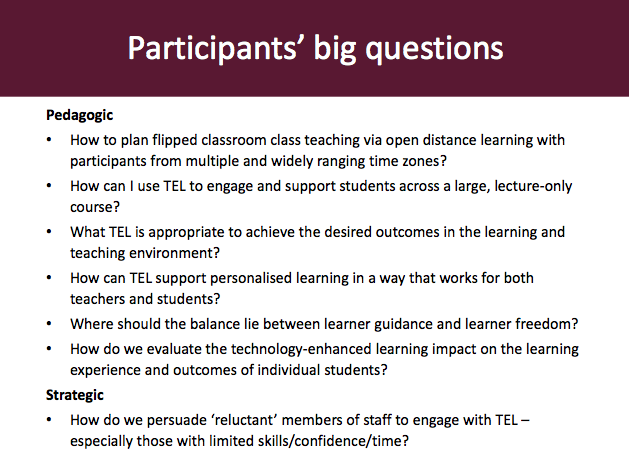Here’s quick overview and recap as the induction part of ocTEL draws to a close and we approach the start of the main course next week.
The aims we set for this part were for you to
- have a sense of different Technology Enhanced Learning (TEL) contexts and some of their strengths and weaknesses
- understand the range of prior experiences and expectations of the course participants, including those from different cultures, and the implications of these for this form of TEL
- achieve basic confidence in navigating, discussing and otherwise participating in the ocTEL course.
One of the main activities was to frame a ‘big question’ about Technology Enhanced Learning and there’s been a great array of these. Diana Laurillard gave us a classification of them in her webinar presentation:

Diana Laurillard’s analysis of the TEL questions raised by participants
Thanks also to Tom Franklin who provided a more fine-grained analysis of questions posed via the JiscMail list (simple version below, or more comprehensive version on Tom’s blog):
One of the observations I’ve made in commenting on a few of the blog posts I’ve seen is that our suggestion that you come up with a ‘big’ question has led many of you (not unreasonably) to frame your questions in general and abstract terms that could be applied to the whole sweep of Higher Education and the role of technology within it. That’s fine, but big questions can also be personal and concrete ones. For example, your interest in peer assessment and support is a big issue for you if you see this as the only way that you can make your new course work effectively. So don’t be afraid to frame your questions in personal and local terms, as this will mean that, if you hold the questions in mind as you work through the rest of the course, it will focus you on practical ideas that you can apply in your day-to-day practice.
We also encouraged you to introduce yourselves to others, and this has demonstrated both the diversity of experience among participants and the enthusiasm for TEL-related professional development. The diversity was a lesson for us as course designers as well, as we saw the Death by Acronyms forum topic emerge. We will be reviewing all the materials for the rest of the course to ensure we are not too blinkered by the UK-centric origin of ocTEL.
Some questioned whether it was really such a good idea to encourage a thousand people to introduce themselves to each other. In the process of the introductions and the sharing of big questions, a lot of ‘discussion traffic’ was generated and some people felt overwhelmed (indeed some may still do so). The JiscMail list is probably where there’s been most evidence of people being uncomfortable with the communication channel (and I’ve said what we would do differently, with hindsight). We’ve taken the lessons for this course, but hopefully there are also lessons in terms of the strengths and weaknesses of different communication channels that have broader implications for TEL. Meanwhile, the JiscMail list seems to have established at least temporary equilibrium (many unsubscribed in the early, busy days as numbers fell from around 800 to just over 700, but they’re now back up to 790+ as we welcome new registrations).
I hope some of you will feel that, over the last nine days, you’ve got some new insights about what works and doesn’t work for you, as in Sandra Huskinson’s message:
Experimenting has been interesting via the different channels of communication. I’ve found I get replies relatively quickly via all forms of media. Keeping tweets short is a challenge. The learning in either format is good although things are limited in twitter useful links are posted. I don’t think there is a ‘best’ for reflection, challenging or learning as I found each format did this in its own way.
In case you’re a bit of a numbers and trends geek, here are a few figures on the different channels of ocTEL communication as of the time of writing (mostly taken from our Course Reader, which is the best way to track all ocTEL discussions) :
Please be assured that no one person is keeping on top of all of this activity! ocTEL deliberately gives you the choice of which of these channels to use for each activity, according to what you feel is most convenient and rewarding. I’ll be interested to see the trends in how these figures change over the coming weeks.
If you’ve read all the way down to here, thank you, and I hope you feel you’re getting the hang of it. That basic confidence really is the one most valuable thing you can carry forward into the rest of the course.
The materials for Week 1, TEL Concepts and Approaches, will be emailed round on Monday. If you’re eager to get under way with them, they will be available on the website some time on Saturday morning (UK time), under Course Materials.

